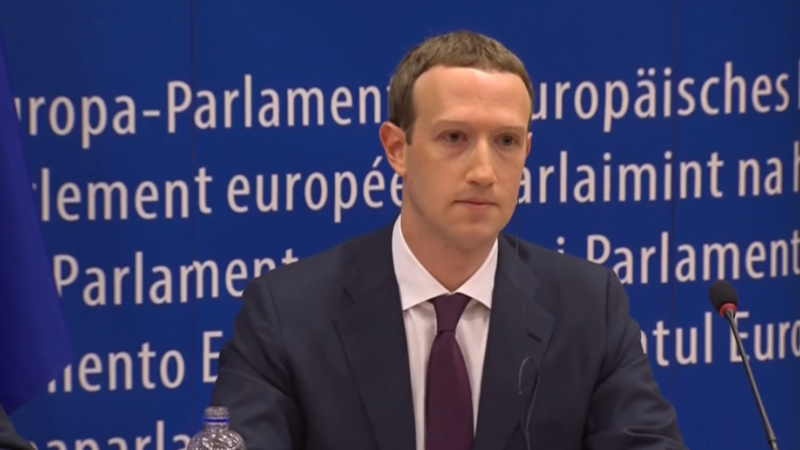Mark Zuckerberg's EU hearing was little more than window-dressing. It's time for governments to look at breaking up the online monopolies.

This week advocates of reforming ‘big data’ suffered a loss at the European Parliament – with Mark Zuckerberg’s appearance before MEPs described by the New Statesman’s Nicky Wolf as “half an apology, half a victory lap.”
Between a vague set of answers, incoherent questioning and an assured brand of listening, Zuckerberg emerged unharmed from what many previously assumed to be, when compared to the lightweight treatment he received from the US Senate, the lion’s den.
“I asked six yes or no questions and got not a single answer,” were the closing remarks of the Co-Chair Greens–European Free Alliance Philipe Lamberts MEP.
The format allowed Zuckerberg to spend only twenty minutes answering questions.
In short, little was accomplished, save for a visible increase in frustration with Zuckerberg from MEPs.
This frustration was palpable – and we should use it to encourage new interpretations of data monopolies.
The long-awaited implementation of GDPR regulations mark a new step in regulatory pressure on companies that trade on data.
Although it is not cybersecurity-specific, the laws will act as an introductory move to enforce self-regulation, alongside the business-led Cybersecurity Tech Accord.
However, the private sector does not have the best track record for self-regulation.
Instead, we should start looking at government regualtion – perhaps even breaking up Facebook..
To give this idea scope, parties of both the left and the right in the European Parliament are considering it. Liberal leader Guy Verhofstadt asked Zuckerberg if he’d be willing to split off Facebook Messenger and WhatsApp to demonopolise the company.
Major financiers, such as the Chairman of HSBC Douglas Flint, have also called for a regulatory crackdown on social media. (As a note, despite Brexit, our future tech policies look set to mirror the European Union’s.)
The best basis for action lies in Germany, whose coalition agreement includes an update on new Antitrust Laws. “Competition 4.0” revamps its approach to the digital economy, giving data protection a rightful precedent over cash.
Using data over currency, Facebook, regardless of its monetary impact, becomes an inarguable market monopoly. It is this interpretation that the left should adopt to ensure that it protects user’s rights.
By focusing on data, we avoid problems such as pricing and can instead focus how these companies can mistreat one’s personal information.
Likewise, because of their near-universal dominance of Facebook and Google, the argument of utility – that they are essential services, can also be made. That in turn makes a breakup not only desirable, but necessary.
We could also look at turning to more traditional forms, such as in the Netherlands, where activists have recently launched the Datavakbond; a data labour union that hopes to negotiate the rights of users with Facebook and Google.
Matt Hancock, the incumbent Culture Secretary whose brief encompasses this, has warned of regulation, but has said little else, leaving a gap which Labour can easily fill with a promise to de-commodify our lives.
Facebook executives are expected to return to Brussels in June. Regardless of its outcome, it is time for the left to take the lead and make the system democratic, not despotic.
Theo Stone is a graduate student in Philosophy at the University of Amsterdam and writes for RightsInfo.
See also: Mark Zuckerberg’s EU hearing livestreamed after pressure




One Response to “Why it’s time to regulate the ‘big data’ giants”
Priscilla Cagle
Hello,
Priscilla here from TopVPN.Review.
I keep an eye on content around the Cybersecurity and came across this article:
https://docs.google.com/spreadsheets/d/1xLu9iGKlG3BkkrB8983EK5OAr2pcI291yA8tlV3Meec/edit#gid=1634794500
I have read your article & just want to say I really liked your article, I found it really informative.
Recently, we have published Eye-Opening Cybersecurity Statistics for 2019:
https://topvpn.review/cybersecurity-statics/
We’ve researched and picked quite a few of the most relevant and reputable statistics about cybersecurity.
I thought it might make a nice addition to your article.
What do you think?
Looking forward to your response!
Stay awesome!
Priscilla Cagle
Chief Editor, TopVPN.Review